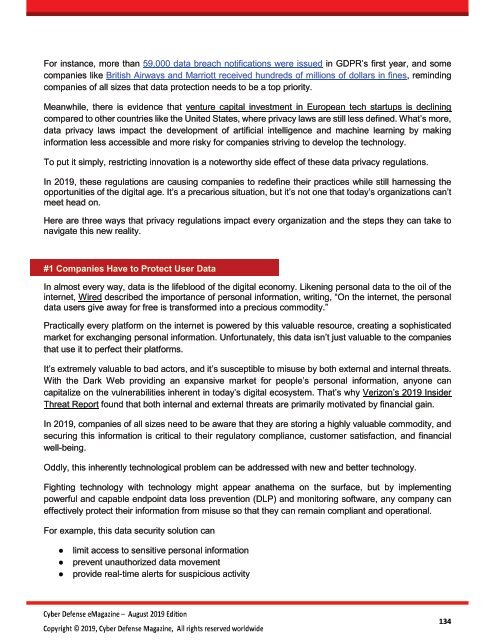Cyber Defense eMagazine August 2019
Cyber Defense eMagazine August Edition for 2019 #CDM #CYBERDEFENSEMAG @CyberDefenseMag by @Miliefsky a world-renowned cybersecurity expert and the Publisher of Cyber Defense Magazine as part of the Cyber Defense Media Group
Cyber Defense eMagazine August Edition for 2019 #CDM #CYBERDEFENSEMAG @CyberDefenseMag by @Miliefsky a world-renowned cybersecurity expert and the Publisher of Cyber Defense Magazine as part of the Cyber Defense Media Group
Create successful ePaper yourself
Turn your PDF publications into a flip-book with our unique Google optimized e-Paper software.
For instance, more than 59,000 data breach notifications were issued in GDPR’s first year, and some<br />
companies like British Airways and Marriott received hundreds of millions of dollars in fines, reminding<br />
companies of all sizes that data protection needs to be a top priority.<br />
Meanwhile, there is evidence that venture capital investment in European tech startups is declining<br />
compared to other countries like the United States, where privacy laws are still less defined. What’s more,<br />
data privacy laws impact the development of artificial intelligence and machine learning by making<br />
information less accessible and more risky for companies striving to develop the technology.<br />
To put it simply, restricting innovation is a noteworthy side effect of these data privacy regulations.<br />
In <strong>2019</strong>, these regulations are causing companies to redefine their practices while still harnessing the<br />
opportunities of the digital age. It’s a precarious situation, but it’s not one that today’s organizations can’t<br />
meet head on.<br />
Here are three ways that privacy regulations impact every organization and the steps they can take to<br />
navigate this new reality.<br />
#1 Companies Have to Protect User Data<br />
In almost every way, data is the lifeblood of the digital economy. Likening personal data to the oil of the<br />
internet, Wired described the importance of personal information, writing, “On the internet, the personal<br />
data users give away for free is transformed into a precious commodity.”<br />
Practically every platform on the internet is powered by this valuable resource, creating a sophisticated<br />
market for exchanging personal information. Unfortunately, this data isn’t just valuable to the companies<br />
that use it to perfect their platforms.<br />
It’s extremely valuable to bad actors, and it’s susceptible to misuse by both external and internal threats.<br />
With the Dark Web providing an expansive market for people’s personal information, anyone can<br />
capitalize on the vulnerabilities inherent in today’s digital ecosystem. That’s why Verizon’s <strong>2019</strong> Insider<br />
Threat Report found that both internal and external threats are primarily motivated by financial gain.<br />
In <strong>2019</strong>, companies of all sizes need to be aware that they are storing a highly valuable commodity, and<br />
securing this information is critical to their regulatory compliance, customer satisfaction, and financial<br />
well-being.<br />
Oddly, this inherently technological problem can be addressed with new and better technology.<br />
Fighting technology with technology might appear anathema on the surface, but by implementing<br />
powerful and capable endpoint data loss prevention (DLP) and monitoring software, any company can<br />
effectively protect their information from misuse so that they can remain compliant and operational.<br />
For example, this data security solution can<br />
●<br />
●<br />
●<br />
limit access to sensitive personal information<br />
prevent unauthorized data movement<br />
provide real-time alerts for suspicious activity<br />
134


















